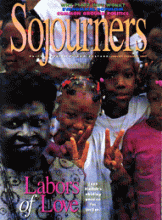First, an appropriately Catholic confession: I'm not a "cradle Catholic." I didn't attend 12 years of parochial schools, didn't grow up praying the Rosary and memorizing the catechism. Raised a Southern Baptist, I joined the Catholic Church nearly three years ago, at age 25.
I hate the term "convert"; I've been a Christian since I was 9, and didn't see this path as a radical alteration in my spiritual journey. Rather, I found a congregation where I felt the presence of the Holy Spirit, found a commitment to working for justice and racial reconciliation, and a pastor and spiritual mentors who allowed, even encouraged, me to ask difficult questions, both of myself and of my community of faith. In the Catholic Church, I discovered people with a hunger to enhance and renew the Christian faith and grapple with the big questions while remaining within the institutional church.
Now, voices calling for dialogue on controversial issues are arousing criticism from those who claim that the teachings of the Catholic Church do not leave room for discussion.
The "We are Church" referendum currently circulating in the United States calls for "genuine dialogue in the whole church" on a range of polemic issues. More than 2.3 million Catholics in Germany and Austria signed the referendum. In the United States, reformers are seeking one million signatures of American Catholics by Pentecost 1997. Regardless of where people stand on specific issues the referendum raises, the overriding theme of participation and discussions by the laity is emerging from across the Catholic spectrum.
More than 5,000 Catholics gathered in November for Call to Action's national conference at Cobo Hall in Detroit, site of the original bishops' Call to Action conference in 1976 where more than 1,300 lay, religious, and clergy delegates, appointed by local bishops, began a process of building a more inclusive church.
Read the Full Article
